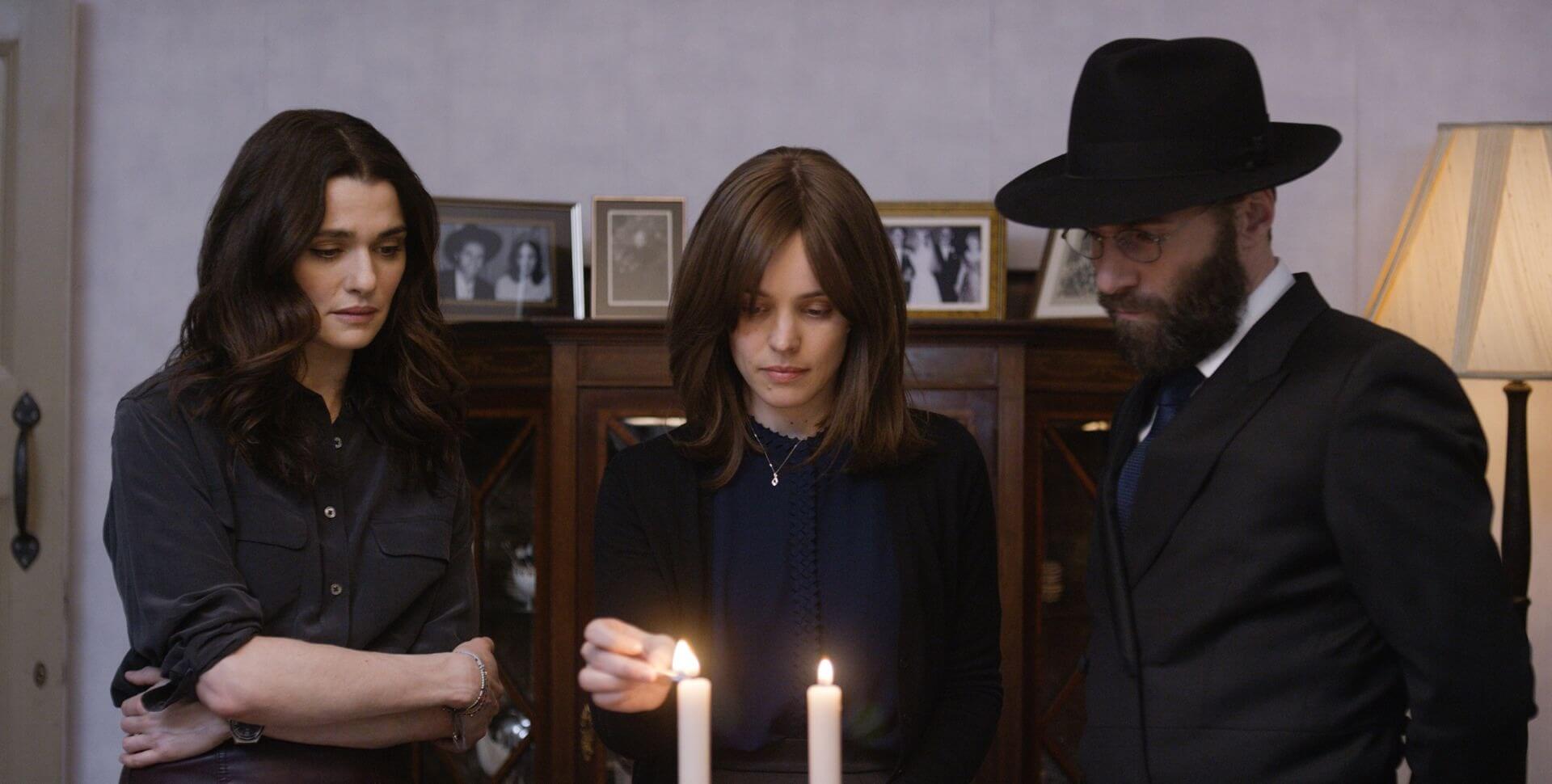Disobedience [2018] tells the tale of Ronit Krushka (Rachel Weisz) who returns to her childhood home upon hearing about the death of her estranged father. She returns to the Orthodox Jewish community which has shunned her for her sexual relationship with her female friend Esti (Rachel McAdams), and upon Ronit’s return, the two friends begin to rekindle their bond over questions of faith, choice, and sexuality. Disobedience is Sebastián Lelio’s follow up to the Academy Award Winner for Best Foreign Language Film of the Year, A Fantastic Woman (2017). It traverses similar themes, however, does so in the form of a passionate love story which focuses on the complexities of friendship, religion, and freedom of choice.
British Wit in an Orthodox World: Powerful performances drive this film from start to finish. All three main actors (Weisz, McAdams and Alessandro Nivola) deliver performances that allow audiences to effortlessly fill in the blanks needed to understand the dynamics of their former years, whilst only witnessing the three of them in this clearly off-skelter quarter life dynamic. Nivola deserves particular praise for his performance as Dovid Kuperman, Esti’s husband and the expected successor to the Rav. In LGBT+ cinema the role of the husband within the lesbian love triangle is so often written and performed in a ham-fisted manner. There's a lot of potential for Dovid to become entirely detestable to the audience, however, Nivola plays this part with the subtle touch required in order for audiences to empathize with his own set of struggles, although he serves as the barrier between Esti and Ronit. McAdams encapsulates a consistent feeling of helplessness. There are moments her English accent slips slightly which drew me out of the story and this could have been improved upon. However, even saying that in the climax of confrontation between herself and Nivola’s Dovid, she offers audiences a gut-wrenching portrayal of sorrow and the pure desire for independence. Another point of strength is the chemistry between the Rachel’s- the two of actresses portray lost love through stolen glances and slight nuances that are sure to make many a heart skip a beat. The shining star of this film is Rachel Weisz. She truly excels in bringing wit and light to otherwise tense situations with her snark and sarcasm, Ronit is a fully realized character and one that brings light without abandoning entirely the feelings which are tied to the darker circumstances within her life. A scene over Shabbat portrays prominent members of the community questioning her about the absence of a man or children in her life. Weisz does not miss a beat, clapping back and displaying to McAdams’ Esti what it means to reclaim your voice and offering motivation for Esti to act on her desire for independence as a queer woman.
Not Your Run of the Mill Queer Romance: LGBT+ cinema is currently at a crossroads. Studios have recently discovered that marginalized stories often generate buzz and, as a result, can be quite lucrative. However, far too often these films are held to lower standards of quality merely because of the presence of queer characters. Already, tropes and cliches have arisen in the lesbian romance sub-genre; whether it’s gratuitous softcore porn sex scenes that last five minutes too long, the film concluding in a tragic suicide, the straight married woman falling for her lesbian florist, carpenter, teacher, boss; the list is never-ending. This was a film I went into praying it would land closer to the Carol end of the spectrum than the Below Her Mouth end of the spectrum; I left the film feeling so insanely relieved. This film goes far and beyond simply being a love story, it is an expert character study from multiple angles. As previously stated, Dovid’s plotline is an extremely unexpected point of interest within this film. Not only does his character struggle in the grips of a love triangle, but this is a love triangle that threatens to disrupt his memories of childhood friendship, his ultimate goal of becoming the Rav, humiliation within his community, and losing the love of his life; most importantly it portrays these stakes without belittling the stakes of all three characters. The film expertly navigates their dynamic and leaves the audience with even more questions than just will they, won’t they?
A Slow Burn Isn’t Always a Bad Thing: This film has a very, very slow burn but this isn’t necessarily a bad thing. This is a slow burn that allows for all of the aforementioned to occur so seamlessly, most of the films outcomes feel earned and fit into the sequence of narrative, we empathize with all characters involved and understand their motivations deeply. The chemistry between Ronit and Esti also has quite a bit to owe to the pacing and editing of this film. Lelio offers audiences only small moments and resultingly, each of these small moments carries with them immense weight. When the two finally do confront each other, Lelio has audiences fidgeting in their seats, the desire for the two to finally embrace is practically enough to have audiences cheering as their lips meet for the very first time; as if watching a game of super gay football.
Disobedience is LGBT+ cinema done right.
It does not rely on the sexuality of its characters to be the only interesting feature of it, and instead, offers audiences a rich tale centered on faith, friendship, and what it means to be truly free.

Disobedience is featured on Borrowing Tape's Best Films of 2018 list.
